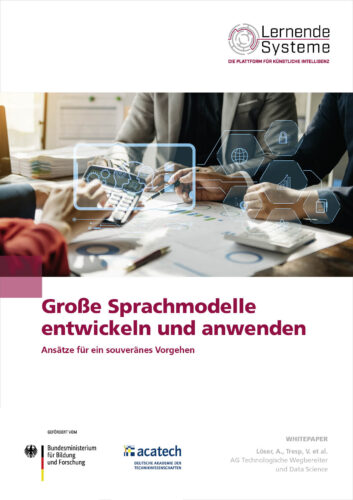Generative AI: confidently seizing opportunities for the economy

Munich, 05 December 2023
Large AI language models that generate text or program codes can increase the competitiveness and innovative strength of the German economy enormously. However, the most advanced generative AI models currently come from the USA and China – and mostly do not meet the ethical and legal requirements discussed in Europe. A current white paper from Plattform Lernende Systeme uses practical examples to illustrate the opportunities and challenges of language models and analyzes the conditions under which companies can leverage the potential of the technology with confidence and legal certainty. The experts recommend the creation of an open, commercially usable data set in German that complies with European values and rules and supports the development of language models in Germany.
The economic potential of generative AI language models is enormous. For example, the technology promises improved access to company knowledge for employees and the automation of repetitive and error-prone processes such as the processing of business documents. In medicine, generative AI models can support a more precise prediction of disease progression and relieve healthcare professionals of documentation and administrative tasks.
“From the perspective of AI research, large language models represent a significant technological breakthrough. They unlock the intelligence of language. They enable solutions that were previously beyond technological possibilities and now seem self-evident,” says Volker Tresp, Professor of Machine Learning at Ludwig-Maximilians-Universität München and Head of the Technological Enablers and Data Science working group of Plattform Lernende Systeme.
Potential and challenges for companies
An important reason for the wide range of possible applications of the language models is that the elaborately trained models can be reused and adapted to industry and company-specific requirements. The resource-intensive training of a separate AI model is no longer necessary. In many applications, however, the AI models must be able to access sensitive data, such as patient information in medicine or business data when used in companies. According to the white paper, few companies would be prepared to hand over such data to external model providers. Legally compliant use of large AI models is important for companies. The model should be developed in line with European values and rules. It should also be transparent which data was used to train the models. Prominent models from the USA and China largely do not meet these requirements. In addition, non-European AI models only have a comparatively small proportion of German text data in the training data set, which can lead to errors in the generated German texts.
Legally compliant, German-language AI models
In view of the increasing influence of non-European models, there is a need to create alternatives in order to drive innovation and competitiveness in Germany and Europe, the authors of the white paper emphasize. In terms of digital sovereignty, language models are needed for the German language and according to our value systems. The basic prerequisite for training large language models is correspondingly extensive and curated training data sets.
“Many companies currently want to use language models. Unfortunately, there are hardly any high-performance German-language models on offer. A strong open source offering made in Germany can create new competition. This only requires 20 terabytes, i.e. 10 laptop hard disks, of German-language data. An indispensable prerequisite is therefore an open source project that makes this data commercially usable in high quality and offers it license-free so that a broad community can design a secure AI,” says Alexander Löser, founder and spokesperson of the Data Science Research Center at the Berlin University of Applied Sciences and member of Plattform Lernende Systeme.
Another prerequisite for the training and application of large AI language models in Germany is a powerful computing infrastructure. This should grow in line with the increasing demands on the computing power required for AI models, the authors recommend. In addition, the AI community should be strengthened and talents in research and industry with the relevant AI knowledge and domain expertise should be promoted.
About the white paper
The white paper “Developing and applying large language models. Approaches for a confident approach” was written by members of the Technological Enablers and Data Science working group of Plattform Lernende Systeme. It is available to download (in German) free of charge.
Special topic on generative AI language models
The new website of Plattform Lernende Systeme provides a detailed overview of generative AI models: The topic special shows how generative AI models work, which applications they enable in companies and which skills are necessary for employees and AI experts. The website is available here.





